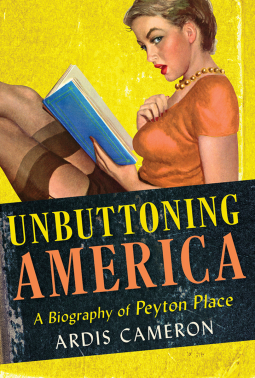
Unbuttoning America
A Biography of "Peyton Place"
by Ardis Cameron
This title was previously available on NetGalley and is now archived.
Send NetGalley books directly to your Kindle or Kindle app
1
To read on a Kindle or Kindle app, please add kindle@netgalley.com as an approved email address to receive files in your Amazon account. Click here for step-by-step instructions.
2
Also find your Kindle email address within your Amazon account, and enter it here.
Pub Date May 21 2015 | Archive Date May 05 2015
Description
Published in 1956, Peyton Place became a bestseller and a literary phenomenon. A lurid and gripping story of murder, incest, female desire, and social injustice, it was consumed as avidly by readers as it was condemned by critics and the clergy. Its author, Grace Metalious, a housewife who grew up in poverty in a New Hampshire mill town and had aspired to be a writer from childhood, loosely based the novel's setting, characters, and incidents on real-life places, people, and events. The novel sold more than 30 million copies in hardcover and paperback, and it was adapted into a hit Hollywood film in 1957 and a popular television series that aired from 1964 to 1969. More than half a century later, the term "Peyton Place" is still in circulation as a code for a community harboring sordid secrets.In Unbuttoning America, Ardis Cameron mines extensive interviews, fan letters, and archival materials including contemporary cartoons and cover images from film posters and foreign editions to tell how the story of a patricide in a small New England village circulated over time and became a cultural phenomenon. She argues that Peyton Place, with its frank discussions of poverty, sexuality, class and ethnic discrimination, and small-town hypocrisy, was more than a tawdry potboiler. Metalious's depiction of how her three central female characters come to terms with their identity as women and sexual beings anticipated second-wave feminism. More broadly, Cameron asserts, the novel was also part of a larger postwar struggle over belonging and recognition. Fictionalizing contemporary realities, Metalious pushed to the surface the hidden talk and secret rebellions of a generation no longer willing to ignore the disparities and domestic constraints of Cold War America.
Advance Praise
"Unbuttoning America is a wonderful book about a fascinating and historically significant topic: Grace Metalious, her novel Peyton Place,
and her readers. It is clearly argued, strongly researched,
impressively structured, and beautifully written. The consistent use of
readers' fan letters, combined with quotes from Metalious and her
personal and professional contemporaries, provides a thorough analysis
and vivid sense of the production and reception of this literary
blockbuster. The energetic writing, with Ardis Cameron's voice coming
through on every page, makes the book lively. Cameron’s rich historical
contextualization allows the reader to grasp the full meaning and
significance of Peyton Place and its cultural work."—Jennifer Frost, University of Auckland, author of Hedda Hopper’s Hollywood: Celebrity Gossip and American Conservatism
"Seldom have I encountered a book as well-written and argued as Unbuttoning America.
Ardis Cameron has mastered a tremendous amount of knowledge of the
historic era, popular literature and popular culture, women's writing,
women’s reading, the literary marketplace, New York publishing, the
history of sexuality, the construction of New England, consumer culture,
and the sociology of everyday life. Cameron deploys this material
lightly, with consummate skill, to produce a
revelatory account that illuminates how a popular book enters and
transforms the cultural landscape."—Judith E. Smith, University of
Massachusetts, Boston, author of Visions of Belonging: Family Stories, Popular Culture, and Postwar Democracy, 1940–1960
Available Editions
| EDITION | Other Format |
| ISBN | 9780801453649 |
| PRICE | $24.95 (USD) |
Links
Average rating from 26 members
Featured Reviews
 Elyse W, Reviewer
Elyse W, Reviewer
"Peyton Place spilled the beans".....
Sexual satisfaction for women had gained new respect --- part of the postwar legacy.
In reading "A biography of Peyton Place", we learn of a historian named Kenneth Davis who first explored the connection between Alfred Kinesey's 1953 report "Sexual Behavior in the Human Female" and the connection and the novel Peyton Place.
What shocked Americans about Kinesey, was not just the explicit nature of his findings; rather it was the lack of remorse expressed by unmarried mothers, mothers, adulterous wives, and active single women. "The chaste conceded only that they had lacked opportunity".
Woman may have liked sex but official talk of pleasure began around the bed. Women and girls were not only enjoying sex -but enjoying it often --on their own terms. The news came as a major challenge to polite notion that 'good girls' don't. They represented this unspoken reality.
"Dirt" took readers down below where the unfiltered truth was hidden. Desire and difference hovered over every page -sexual desire to be sure, but also the kinds of yearning and dislocation no easily translated into political understandings.
What interested me in reading this 'Biography' of Peyton Place -- was the timing of 'today'.
Right now, the movie "Fifty Shades of Gray" is the number #1 movie box office hit in America.
The books were Best Sellers.
As a married female who remembers watching the TV show -a few times a week - as a young unmarried women --with my own mother --I still can remember 'the-talk-around-town'.
That same 'talk-around-town' was buzzin when "The Fifty Shades of Gray" books were at its peak, and the buzzin is starting in again with the movie. What is going on?
What is really "the unspoken reality"? Is it going to take another 50 years to read the new UP-dated "Unbuttoning American"? Do we need the academics to explore this topic for us?
I saw many parallels in this biography --many of the same reactions --(shocking and liberating) with the journey American's took with 'sex talk' around Peyton Place. With Both Peyton Place and "Fifty Shades", some people would hide reading their books in public. Others were speaking out about how wrong it is to 'abuse women' and 'control' woman...(destroying all the work feminist have done).
Yet, the biggest news of all is hearing bright educated self efficient women whispering "they want to be controlled" 'in the bedroom. (Many want want to explore more 'Gray' areas).
Sex Talk in America is happening again. Mainstream American was to open up the doors again.....and get inside the 'desire' of what women want in the bedroom!
This was an excellent-interesting book. Perfect time to read it ---for those who are still curious about the 'hype' of "Fifty Shades of Gray"....and for those who were fans of Peyton Place.
Remember the old saying, "History repeats itself"?
It kinda is.....
 beth e, Librarian
beth e, Librarian
Unbuttoning America is more than a book about Peyton Place. Ardis Cameron offers multiple layers of complexity in this book exploring the cold war and the ways in which Peyton Place flourished both as entertainment and a way of life. Cameron examines the women of Peyton Place from a feminist perspective as the women explore their lives more fully which leads to changes on a community level. A fascinating analysis of this subject, Cameron's well-researched book is both fun and thoughtful.
Such an interesting look at Grace Metalious & her controversial book "Peyton Place." Cameron did a great job researching and this book was so well written. Loved the use of fan letters to Metalious. This book gives such perspective on "Peyton Place" and the significance of this book in modern American literature. I recently read "Peyton Place" and reading this shortly after helped give me much more insight.
 Helen C, Reviewer
Helen C, Reviewer
It's hard to imagine what a splash Peyton Place made when it came out in the Fifties. It addressed issues that were largely not discussed except in whispers, issues such as incest, child abuse, date rape, and perhaps the most dangerous of all, feminism. Of course it was the sex that sold the book, and that's what most people remember about it even today.
Ardis Cameron looks at Peyton Place in its mid-century historical context, as a publishing phenomenon, at its incarnations as a movie and as a TV series, at the reactions among critics and fans, and at the author, Grace Metalious, herself.
The divide that Peyton Place exposed was evident in a single household. While noted critic Bernard De Voto was harrumphing over the "cultural tripe" that was infesting the literary world, his wife, book reviewer and editor Avis De Voto got a letter from family friend Julia Child saying she had "quite enjoyed it." She said that Metalious "does have a style, and a manner of creating atmosphere and character." And that having finished Peyton Place, she was ready to return to the Goethe she'd been tackling before that.
Metalious wrote Peyton Place as a serious effort, not as is suggested by the lurid paperback cover art, as pulp fiction. In a way, it was as much a protest against the status quo as was Betty Friedan's The Feminine Mystique, which wouldn't appear until 1963, seven years after the debut of Peyton Place. Metalious was considered an outsider of sorts due to her "exotic" ethnicity of French Canadian and her husband's Greek heritage. She would never be allowed to fit in, so she decided to stand out.
Cameron makes an academic treatment of literature into a fascinating ride into Fifties culture, angst, publishing and bookselling, the results of sudden fame and fortune, and reverberations that reach into the 21st century.
 Brian F, Educator
Brian F, Educator
For a cultural history of the power of literature and reading this book is excellent. Cameron's study provides a thorough example of the importance of cultural studies with its exequsite use of context to illustrate how one of the most controversial and best sellers of the 1950s spoke to readers about the changing nature of America, it's citizens, economics and gender expectations. A model piece of scholarship that will provide new approaches to looking at American literature, history and culture in the 1950s and one which I hope will lead to future studies about popular books of past decades, which may offer scholars, citizens and readers alike a more nuanced and complete picture of American history and culture.
 Kel M, Media/Journalist
Kel M, Media/Journalist
You thought “Fifty Shades” was a big deal?
Unbuttoning America: A Biography of “Peyton Place” by Ardis Cameron (Cornell University Press, $24.95).
Americans of a certain generation will remember the fuss that surrounded the publication in 1956 of Grace Metalious’s best-seller about the secret sins of a small town, Peyton Place. It quickly became a pair of popular movies (the first one, with Lana Turner as Constance MacKenzie, then a TV adaptation made a star of an ingénue named Mia Farrow.
In Unbuttoning America: A Biography of “Peyton Place,” Ardis Cameron looks at how the hype surrounding Peyton Place unfolded on the innocent, “I Like Ike” era. She notes how, despite having a reputation for raciness, the novel was actually quite tame—the real target wasn’t our prurience, but our hypocrisy. And its subject matter, which included class snobbery, domestic violence and rape, didn’t invent those social evils; instead, Metalious simply told the story of a town realistically instead of buying the small-town nostalgia for a past that never existed.
The most important thing about Peyton Place? It helped us stop lying about what was really happening in people’s lives. And it turns out, even in the ‘50s, there was a market for honest discussion of community and its flaws.
 albert g, Reviewer
albert g, Reviewer
Unbuttoning America: A Biography of Peyton Place by Ardis Cameron is a social commentary of the impact of what would become one of the most controversial novels of its era and would shape American Women's fiction for generations to come. It is at times unnerving as it is honest. An impactful summary of a time in America when the dirty little secrets of small town America were kept carefully hidden.
"...Not surprisingly, proponents of women's rights were there from the beginning, defending a woman's right to read whatever her heart desired, more or less. But the relationship between fiction, fantasy, and femininity raised for feminists as well a number of troubling questions..."
Peyton Place was published in 1956 and became a literary phenomenon. A bestseller about murder, incest, female desire and social injustice. It was condemned by leaders in politics and the clergy for its immorality. The author, Grace Metalious, was an unknown writer. A housewife who wrote her stories in her spare time. She would come upon the lurid tale of murder and rape that would be the basis of her novel and catapult her into international fame. The term Peyton Place, to this day, refers to a small town and its secrets.
"...the novel found cultural traction as a salacious, spicy, even 'sexsational' novel, a reputation the publishing industry kindled. Even before it hit the bookshelves, the novel was marketed as so shocking that it had caused the dismissal of the author's husband from his teaching job. Pictures on the front pages of New England newspapers showed a smile Grace Metalious surrounded by her family and her unemployed husband, George. What kind of wife could do such a thing? What kind of mother could write such a book..."
Peyton Place was based loosely upon the murder of Sylvester Roberts by his daughter Barbara in the village of Gilmanton, New Hampshire, in the fall of 1947. The trial would show that Barbara did in fact kill her father, but it would also bring to light the years of abuse she suffered at his hands. The beatings and the rapes. In the writing of Peyton Place, Metalious was told to make certain changes to her novel. Changes that her publishers demanded. In her book, the daughter Selena was raped by her stepfather and not her father. In the book, they were poor white trash and not the landowners that the Roberts of Gilmanton, New Hampshire were. Regardless of the truth, only a poor, impoverished family would commit incest. And only a stepfather would, certainly not a good church going father. The pivotal scene in the novel, where the frightened teenage daughter is forced to seek out an abortion. The result of her father's continual rapes. The scene where the town doctor must decide what to do nearly twenty years before Roe vs Wade, during a time that performing an abortion would sentence him to prison.
"...You've lost, Matthew Swain, it said. You've lost. Death, venereal disease and organized religion, in that order, eh? Don't ever let me hear you open your mouth again. You are setting out deliberately this night to inflict death, rather than to protect the life as you are sworn to do.
'Feeling better, Selena?' asked the doctor, stepping into the darkened bedroom.
'Oh, Doc. I wish I were dead.'
'Come on now,' he said cheerfully. 'We'll take care of everything and fix you up as good as new.'
And to hell with you, he told the silent voice. I am protecting Life, this life, the one already being lived by Selena Cross..."
Peyton Place came on the American cultural scene at a time when Leave it to Beaver, Father knows Best and Gunsmoke ruled the television screen. White Christmas and Singing In the Rain ruled the movie screen. A novel, and subsequent television show about the salacious and lurid secrets of small town America unnerved the established programming Gods but the American Housewife ate it up like candy. As they would eat up a trio of novels about a young innocent girl being initiated into a BDSM sexual relationship seventy years later. The daytime soap operas changed dramatically after Peyton Place. More importantly, it brought out in the open for discussion, sexual abuse of young girls and the social response of blaming the promiscuity of the young girl and not the man involved. In its way, it began a change in the landscape of the American perspective.
Ardis Cameron has written a meticulously researched book on the social, emotional and political ramifications of the novel Peyton Place. She argues, by intention or not, the novel became a rallying cry in the battle for recognition in feminism and civil rights. A voice given to those, that as an society, we chose to not believed even existed.
An important book. A very well written book.
A good read.
Readers who liked this book also liked:
Silvia Moreno-Garcia
Historical Fiction, Literary Fiction, Sci Fi & Fantasy


















